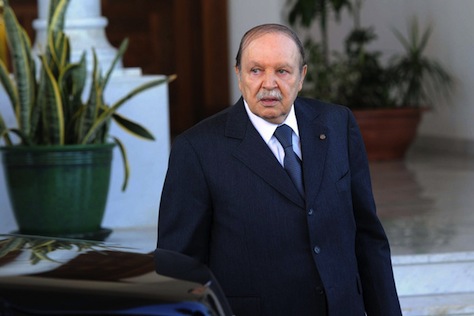Though Algeria quickly became one of the first countries where the ‘Arab Spring’ protests gained momentum three years ago, its longtime president Abdelaziz Bouteflika is almost certain to win a fourth term in Thursday’s presidential election. ![]()
Algerians, like many others throughout north Africa and the Middle East, coalesced in protest of higher prices, massive unemployment and the general lack of economic progress. But with memories of Algeria’s brutal, decade-long civil war of the 1990s still fresh, it was enough for Bouteflika (pictured above) to agree to end the 19-year period of ’emergency rule,’ lift some of his government’s more oppressive measures against political expression and introduce subsidies to lower the price of food and other necessities.
Besides, most Algerians thought, he would be too old at age 77 to run for a fourth term. Nonetheless, despite a campaign to convince Algerian voters to boycott tomorrow’s vote, Bouteflika will theoretically extend his rule through 2019.
But Bouteflika’s reelection campaign says less about Bouteflika than it does about the power struggle bubbling beneath the surface. Frail and unable to walk, Bouteflika suffered a stroke last year and spent four months receiving medical treatment in Paris. No one thinks he’ll last another five years. At a recent meeting with US secretary of state John Kerry, he could barely stand up or and he seemed unable to speak clearly.
So why not groom a successor and let Bouteflika slip into a comfortable retirement? Continue reading Bouteflika headed for controversial fourth term

